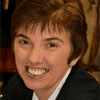If anyone has a phobia for flying, chances are that recent news headlines have caused you to think twice about booking your next flight! Most recently, it was the crash of the Turkish Airlines Boeing 737 into a muddy field just three kilometers from Amsterdam's Schiphol Airport. Miraculously, we heard of survivors. Yet the week before, it was the tragedy of Continental Flight 3407 crashing into a Buffalo neighborhood; in this instance, no survivors.
Perhaps the story that has amazed us the most is the downing of US Airways Flight 1549 into New York's Hudson River. We will not easily forget the images of 155 survivors standing knee deep in water on the wings of this plane, waiting for their rescue. The pilot, Chelsey (Sully) Sullenberg, has been acclaimed the “Hero of the Hudson.” Yet amidst all that has been said about this man, our local radio station in Winnipeg carried an inside scoop to this story that definitely caught my ear. Apparently, after the crash Sullenberg remembered that a book he had borrowed from his hometown library was still in his flight bag. Unfortunately this was still stored somewhere in the submerged cargo-hold of the plane. As the story goes, Sullenberg contacted the library to ask if he could renew the book until he could either retrieve it or replace it. The library was so taken with Sullenberg's integrity that they offered to replace the book themselves and dedicate it to his honour. The local Winnipeg reporter put his own spin on the report when he said, “Can you believe it? It kind of restores your faith that there still are a few good guys left in the world after all!”
The reporter's comment leads to a missional observation on my part, in that the world still looks for the “good guys.” The world is impressed when it sees goodness in action. It's inspiring to think there are still people who are intentional about keeping rules and honoring deadlines, recognizing that what we do has an impact on others. It's reassuring to know that there are still people conscious of what it means to be the caretaker of another person's property and to honour the need for timely return.
As I translate this into a more global context, perhaps it is a restoring of goodness in our world that would ultimately lead to the resolution of world wars and racial conflict. Seeing a bit more “goodness” spread around the globe could really change our news headlines.
For the Christian believer, we know that living a good life can't simply be about working to be a good person or adding up our number of good deeds. Living as a participant in the Kingdom simply doesn't work that way. Perhaps this was what Jesus was getting at when he sat with his disciples on the mountainside and talked about being salt and light (see Matthew 5:13-16). It's interesting how Jesus qualified it. It wasn't just part of the disciples' new job description to be influencers in a world that had grown dark and stale. There was a missional purpose to be embraced. They were to “let their light shine before others, so they would see their good deeds and praise the Father in Heaven” (Matthew 5:16). I guess I am wondering what it takes to cross this divide, so that people understand that the good things we do “in Jesus' name” are because of our relationship with God and that our sole desire is to point others to him.
Imagine if Sullenberg's story had played out a little differently. For instance, what if this Winnipeg reporter had identified Sullenberg's good deed as an action prompted by a personal relationship with Jesus Christ? We don't know if this pilot witnesses to a faith experience. But if this were the case, maybe the reporter's comments would not have been about restoring faith in good people but rather about restoring faith in God himself. Somehow I think that's what Jesus had in mind as he invited us to walk in his steps. Certainly it was to be part of the missional mandate the disciples would claim as they began their journey with Jesus. The challenge was not to just impress with good deeds; the greater goal was to help people see how goodness comes from God himself. It leads me to ask whether the way I'm shining my light leads to others offering their praise and thanksgiving to God. How about you? Got any outstanding library books on your shelf?
 Major Julie Slous is corps officer at Winnipeg's Heritage Park Temple. She also serves as adjunct faculty at the College for Officer Training. In May 2009, Julie will complete her doctoral studies in biblical preaching. Her thesis work centres on “Preaching a Disturbing Gospel─The Homiletic of The Salvation Army for Postmodern Times.” When not studying and writing, personal hobbies include reading, cooking, musical composition and, of course, listening to sermons! Married to Brian, she has three children.
Major Julie Slous is corps officer at Winnipeg's Heritage Park Temple. She also serves as adjunct faculty at the College for Officer Training. In May 2009, Julie will complete her doctoral studies in biblical preaching. Her thesis work centres on “Preaching a Disturbing Gospel─The Homiletic of The Salvation Army for Postmodern Times.” When not studying and writing, personal hobbies include reading, cooking, musical composition and, of course, listening to sermons! Married to Brian, she has three children.
Perhaps the story that has amazed us the most is the downing of US Airways Flight 1549 into New York's Hudson River. We will not easily forget the images of 155 survivors standing knee deep in water on the wings of this plane, waiting for their rescue. The pilot, Chelsey (Sully) Sullenberg, has been acclaimed the “Hero of the Hudson.” Yet amidst all that has been said about this man, our local radio station in Winnipeg carried an inside scoop to this story that definitely caught my ear. Apparently, after the crash Sullenberg remembered that a book he had borrowed from his hometown library was still in his flight bag. Unfortunately this was still stored somewhere in the submerged cargo-hold of the plane. As the story goes, Sullenberg contacted the library to ask if he could renew the book until he could either retrieve it or replace it. The library was so taken with Sullenberg's integrity that they offered to replace the book themselves and dedicate it to his honour. The local Winnipeg reporter put his own spin on the report when he said, “Can you believe it? It kind of restores your faith that there still are a few good guys left in the world after all!”
The reporter's comment leads to a missional observation on my part, in that the world still looks for the “good guys.” The world is impressed when it sees goodness in action. It's inspiring to think there are still people who are intentional about keeping rules and honoring deadlines, recognizing that what we do has an impact on others. It's reassuring to know that there are still people conscious of what it means to be the caretaker of another person's property and to honour the need for timely return.
As I translate this into a more global context, perhaps it is a restoring of goodness in our world that would ultimately lead to the resolution of world wars and racial conflict. Seeing a bit more “goodness” spread around the globe could really change our news headlines.
For the Christian believer, we know that living a good life can't simply be about working to be a good person or adding up our number of good deeds. Living as a participant in the Kingdom simply doesn't work that way. Perhaps this was what Jesus was getting at when he sat with his disciples on the mountainside and talked about being salt and light (see Matthew 5:13-16). It's interesting how Jesus qualified it. It wasn't just part of the disciples' new job description to be influencers in a world that had grown dark and stale. There was a missional purpose to be embraced. They were to “let their light shine before others, so they would see their good deeds and praise the Father in Heaven” (Matthew 5:16). I guess I am wondering what it takes to cross this divide, so that people understand that the good things we do “in Jesus' name” are because of our relationship with God and that our sole desire is to point others to him.
Imagine if Sullenberg's story had played out a little differently. For instance, what if this Winnipeg reporter had identified Sullenberg's good deed as an action prompted by a personal relationship with Jesus Christ? We don't know if this pilot witnesses to a faith experience. But if this were the case, maybe the reporter's comments would not have been about restoring faith in good people but rather about restoring faith in God himself. Somehow I think that's what Jesus had in mind as he invited us to walk in his steps. Certainly it was to be part of the missional mandate the disciples would claim as they began their journey with Jesus. The challenge was not to just impress with good deeds; the greater goal was to help people see how goodness comes from God himself. It leads me to ask whether the way I'm shining my light leads to others offering their praise and thanksgiving to God. How about you? Got any outstanding library books on your shelf?
 Major Julie Slous is corps officer at Winnipeg's Heritage Park Temple. She also serves as adjunct faculty at the College for Officer Training. In May 2009, Julie will complete her doctoral studies in biblical preaching. Her thesis work centres on “Preaching a Disturbing Gospel─The Homiletic of The Salvation Army for Postmodern Times.” When not studying and writing, personal hobbies include reading, cooking, musical composition and, of course, listening to sermons! Married to Brian, she has three children.
Major Julie Slous is corps officer at Winnipeg's Heritage Park Temple. She also serves as adjunct faculty at the College for Officer Training. In May 2009, Julie will complete her doctoral studies in biblical preaching. Her thesis work centres on “Preaching a Disturbing Gospel─The Homiletic of The Salvation Army for Postmodern Times.” When not studying and writing, personal hobbies include reading, cooking, musical composition and, of course, listening to sermons! Married to Brian, she has three children.









Leave a Comment